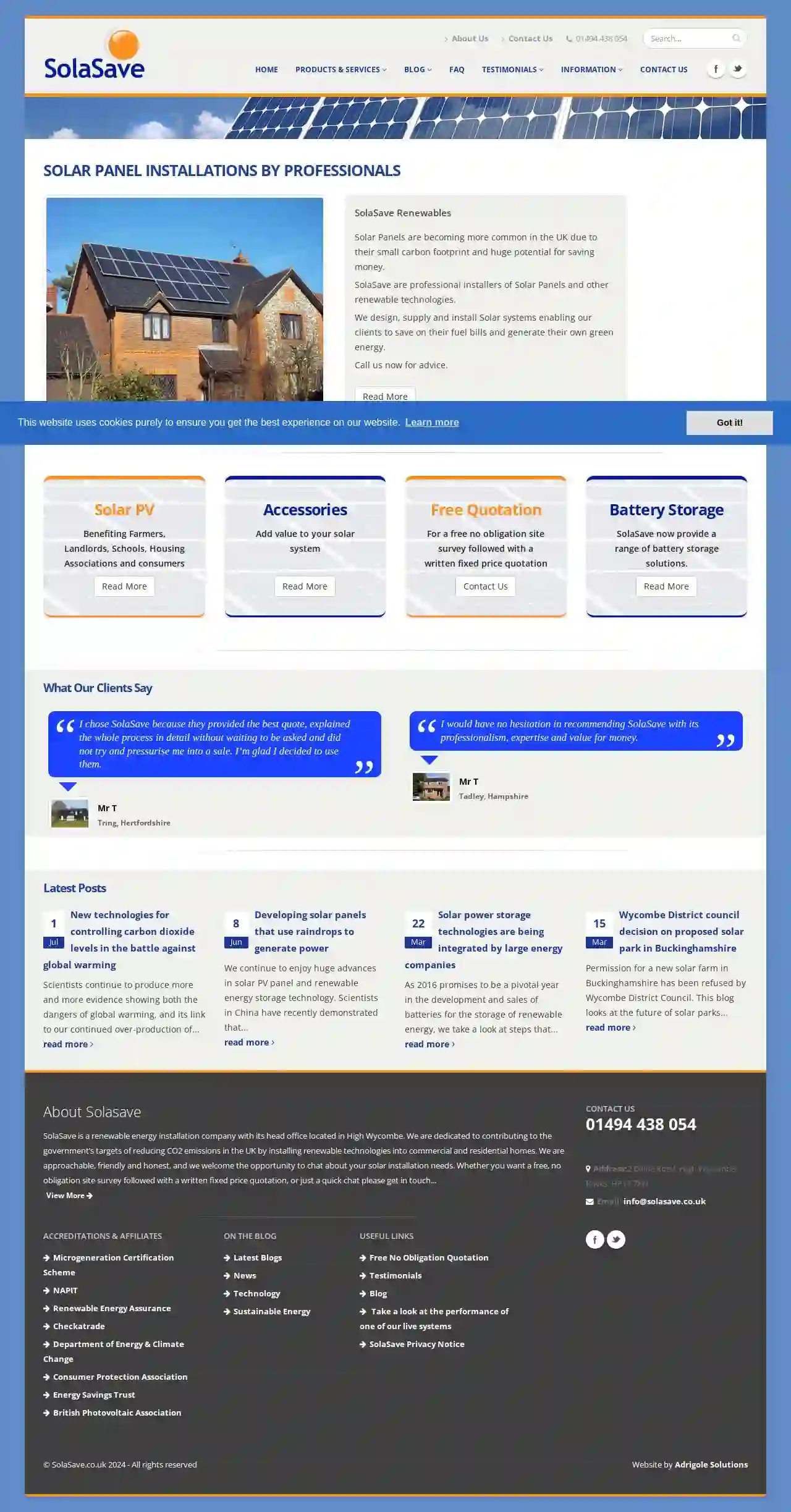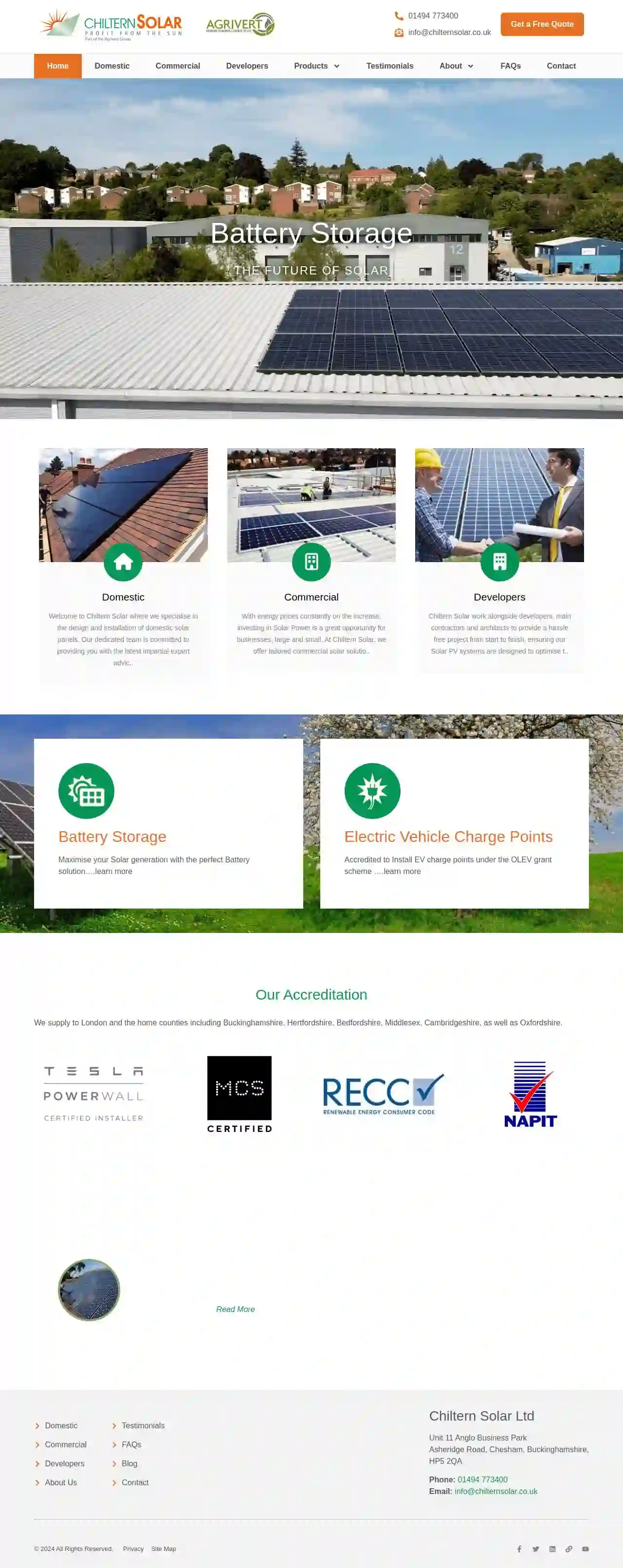Solar Installers Weston Turville
Find top Solar Panel Installers in Weston Turville
Receive up to 3 Solar Companies quotes for your project today! Compare profiles, reviews, accreditations, portfolio, etc... and choose the best service.

Mypower - Commercial Solar Professionals Berkshire
Toddington, Cheltenham, Quercus House, Orchard Industrial Estate, GL54 5EB, GBWelcome to Mypower, the UK's leading commercial solar panel installation company. We design and install solar PV systems for businesses since 2010. Our award-winning installations provide energy at 1/4 of the price supplied by the grid. With over 40% of Britain's energy generated from renewable sources in 2022, solar power is flourishing. We have over 10 years of experience in commercial, industrial, and agricultural solar installations, including roof, ground mount, and bespoke solutions.
- Services
- Why Us?
- Gallery
Get Quote
Vasant Solar Energy
Burnham, 6 Fairfield Road, Sl1 8AH, GBWelcome to Vasant Solar Energy, a renowned name in the solar energy market. We are a renewable energy company based in England, providing top-tier renewable energy solutions for your needs. Our mission is to deliver affordable, sustainable clean energy to commercial and residential areas. With our expertise in solar installation, battery storage, EV chargers, air source heat pumps, on-demand wholesale supply, and on-demand manufacture, we are committed to helping you reduce your carbon footprint and save money on your utility bills. Our team of experts will guide you through the entire process, from consultation to installation, ensuring a seamless and hassle-free experience. Contact us today to learn more about our services and how we can help you harness the power of the sun.
- Services
- Why Us?
- Accreditations
- Our Team
- Testimonials
- Gallery
Get Quote
SolaSave
High Wycombe, Bucks. HP13 7XN, 2 Colne Road, GBSolaSave is a renewable energy installation company with its head office located in High Wycombe. We are dedicated to contributing to the government’s targets of reducing CO2 emissions in the UK by installing renewable technologies into commercial and residential homes. We are approachable, friendly and honest, and we welcome the opportunity to chat about your solar installation needs. Whether you want a free, no obligation site survey followed with a written fixed price quotation, or just a quick chat please get in touch... We design, supply and install Solar systems enabling our clients to save on their fuel bills and generate their own green energy. Call us now for advice.
- Services
- Why Us?
- Accreditations
- Testimonials
- Gallery
Get Quote
Solar Dock
52 reviews123 High Street, Brighton, BN1 1AA, GBSolar Dock is a leading provider of solar panel installation and maintenance services in the UK. With years of experience in the industry, we have a proven track record of delivering high-quality, reliable solutions to both residential and commercial clients. Our team of expert engineers is dedicated to providing exceptional customer service and ensuring that your solar energy system is installed and maintained to the highest standards. We offer a comprehensive range of services, including: Solar panel installation Solar panel maintenance Solar panel repair Solar energy system design Battery storage solutions At Solar Dock, we are committed to providing our clients with the best possible solar energy solutions. We use only the highest quality materials and equipment, and our team is always up-to-date on the latest industry trends. We are also fully insured and accredited, so you can be confident that you are in good hands. Contact us today to learn more about how we can help you save money on your energy bills and reduce your carbon footprint.
- Services
- Why Us?
- Accreditations
- Our Team
- Testimonials
Get Quote
Solar Clear UK Ltd
4.816 reviewsVerna House, 9 Bicester Road, Aylesbury, HP19 9AG, GBWe keep green energy clean Solar Clear UK Ltd provide specialist cleaning and maintenance for solar panels for both commercial and domestic customers. A specialist cleaning and maintenance company, with a qualified team, and accredited to the latest health and safety standards. Based in the heart of Aylesbury Vale in Buckinghamshire, Solar Clear are perfectly based to offer a nationwide Solar Panel Cleaning service, with no expense spared on our high quality specialist cleaning equipment, we offer bespoke services to commercial and domestic customers. With dedicated hard work we are proud to have a solid company with hundreds of satisfied customers, both new and existing. Contact Us
- Services
- Why Us?
- Accreditations
- Our Team
- Testimonials
- Gallery
Get Quote
Solarbility
4.97 reviews33 Dedmere Court, Marlow, SL7 1PL, GBIndependent experts in Solar Panel installations and Battery Storage systems. Helping home owners, new build developers and businesses save money and create a greener future for all. Learn More SERVICES Who we help Home Owners We're dedicated to finding the right system for your household and will support you every step of the way, from design to installation. New Build Our experienced team understand your requirements at each stage of your project. We supply expert design, smooth project management and competitive pricing. Business With the Government offering 50% tax breaks for businesses, installing a solar system is a great way to create efficiencies. Our team are on hand to help scope and design your project. ABOUT What makes us different? Solarbility are UK experts in solar panels and battery storage solutions. We help homeowners, new build developers and business save money from their electricity bills and create a greener future for all with solar power. We supply and install the best solar products including car chargers, protection for photovoltaic panels and accessories. We are a family run business, dedicated to excellent customer service and satisfaction. We listen to your requirements and create bespoke solar array designs and a comprehensive quotation with no hidden costs. We are MCS accredited Solar PV installers and provide full customer protection through RECC, MCS, Napit & CHAS, and you can read many happy customer reviews on google and checkatrade. Solar power costs for home owners has never been cheaper so you can start saving immediately.
- Services
- Why Us?
- Accreditations
- Our Team
- Testimonials
- Gallery
Get Quote
Anglo Solar
Globe Park, Third Avenue Jubilee, Marlow, SL7 1EY, GBAnglo Solar is an open and approachable British company based near London, and we’re always delighted to field enquiries from potential partners and distributors worldwide. Whether you have specific technical questions regarding our solar PV modules or want to discuss the benefits of working with us in more detail, our team is ready for your call. Anglo Solar is a British solar brand owned by Global PV Sales Ltd.
- Services
- Why Us?
- Accreditations
- Gallery
Get Quote
Renovagen Ltd
44 reviewsKuopio, Finland, Leväsentie 23, 70780, GBWelcome to Renovagen, where innovation meets the pressing needs of the ever-evolving global energy landscape. Our core mission is to simplify the integration of sustainable energy for temporary energy needs, making it more accessible, affordable, secure, and sustainable for millions of individuals and organizations worldwide. At Renovagen, we’re not just a technology company; we’re a force of change. We’re driven by the belief that we can transform the way the world accesses, affords, and secures its energy supply. In doing so, we aim not only to improve lives but to save them. Order now Imagine a world where clean, sustainable Solar energy is not only accessible but also effortlessly mobile Renovagen’s innovative products such as the Fast Fold foldable solar generator and the rollable high-power Rapid Roll system, embody this vision. They are game-changers that take rapid deployable clean power to new heights of capability, mobility and scalability. With the Renovagen’s systems, you can now harness the sun’s energy anywhere, anytime. Our revolutionary solar technology enables the rapid deployment of a commercial-scale off-grid solar power system from a compact stand-alone solar generator or from a trailerized unit.Gone are the days of lengthy setups and complex installations. With us, self-sufficient power becomes a reality in even the most remote locations.
- Services
- Why Us?
- Accreditations
- Our Team
- Testimonials
- Gallery
Get Quote
Solarbean Coffee
57 reviews28, School Road, Penn, HP10 8EF, GBSolarbean Coffee is a small-batch roastery based in Penn, Buckinghamshire. We are passionate about sourcing the finest, fairest coffee beans in the world and roasting them to perfection using solar power. Our commitment to sustainability extends to our fully home-compostable packaging and local bicycle delivery. We believe in simple, sustainable, and sensational coffee, and we invite you to come and say hello at our roastery in Penn. Our Story At Solarbean Coffee, we believe in making a positive impact on the world through our coffee. We source our beans directly from farmers who are committed to sustainable practices, and we roast them using solar power to minimize our environmental footprint. Our goal is to provide our customers with the highest quality coffee while also supporting ethical and sustainable sourcing. Our Process Our coffee journey begins with carefully selecting the finest coffee beans from around the world. We work directly with farmers who share our commitment to quality and sustainability. Once the beans arrive at our roastery, we roast them in small batches using our solar-powered roaster. This allows us to carefully control the roasting process and bring out the unique flavors of each bean. Our Packaging We are committed to minimizing our environmental impact, and our packaging reflects this commitment. Our coffee is packaged in fully home-compostable bags, so you can enjoy your coffee guilt-free. Our Delivery We deliver our coffee locally by bicycle, reducing our carbon footprint and supporting sustainable transportation. Come and Visit Us! We invite you to come and visit our roastery in Penn, Buckinghamshire. You can meet our team, learn more about our coffee, and enjoy a cup of freshly brewed Solarbean Coffee.
- Services
- Why Us?
- Testimonials
- Gallery
Get Quote
Chiltern Solar Ltd
5152 reviewsAsheridge Road, Chesham, Buckinghamshire, Unit 11 Anglo Business Park, HP5 2QA, GBWelcome to Chiltern Solar, where we specialise in the design and installation of domestic solar panels. Our dedicated team is committed to providing you with the latest impartial expert advice. We also offer tailored commercial solar solutions for businesses, large and small. Additionally, we work alongside developers, main contractors and architects to provide a hassle-free project from start to finish, ensuring our Solar PV systems are designed to optimise the energy generation. We supply to London and the home counties, including Buckinghamshire, Hertfordshire, Bedfordshire, Middlesex, Cambridgeshire, and Oxfordshire. Our team is committed to providing you with the best possible service, and we are accredited to install EV charge points under the OLEV grant scheme.
- Services
- Why Us?
- Accreditations
- Our Team
- Testimonials
- Gallery
Get Quote
Over 3,485+ Solar Businesses in our network
Our solar companies operate in Weston Turville and surroundings!
SolarCompaniesHub has curated and vetted the Best Solar Installers in Weston Turville. Find the most trustworthy business today.
Frequently Asked Questions About Solar Installers
- Keep Panels Clean: Clean panels periodically to remove dirt, debris, and bird droppings, which can reduce efficiency. Rainfall usually cleans panels adequately, but you might need to hose them down occasionally.
- Visual Inspections: Regularly inspect panels for signs of damage, loose wiring, or other issues.
- Professional Maintenance: Consider having a professional solar installer inspect your system every few years to ensure optimal performance.
- Draw electricity from the grid when your solar panels aren't producing enough power (e.g., at night)
- Sell excess solar electricity back to the grid through net metering.
- Solar Panel Warranty: From the panel manufacturer, typically covering defects in materials and workmanship for 10-25 years. Some manufacturers offer performance guarantees, ensuring a certain level of energy output over time.
- Solar Installation Warranty: From the solar installer, covering the quality of the installation work for 1-10 years. This warranty protects you from leaks, faulty wiring, or other issues caused by improper installation.
How do I maintain my solar panels?
What is the difference between grid-tied and off-grid solar systems?
Will solar panels work during cloudy days or at night?
What kind of warranty should I expect for my solar panel system?
How do I maintain my solar panels?
- Keep Panels Clean: Clean panels periodically to remove dirt, debris, and bird droppings, which can reduce efficiency. Rainfall usually cleans panels adequately, but you might need to hose them down occasionally.
- Visual Inspections: Regularly inspect panels for signs of damage, loose wiring, or other issues.
- Professional Maintenance: Consider having a professional solar installer inspect your system every few years to ensure optimal performance.
What is the difference between grid-tied and off-grid solar systems?
- Draw electricity from the grid when your solar panels aren't producing enough power (e.g., at night)
- Sell excess solar electricity back to the grid through net metering.
Will solar panels work during cloudy days or at night?
What kind of warranty should I expect for my solar panel system?
- Solar Panel Warranty: From the panel manufacturer, typically covering defects in materials and workmanship for 10-25 years. Some manufacturers offer performance guarantees, ensuring a certain level of energy output over time.
- Solar Installation Warranty: From the solar installer, covering the quality of the installation work for 1-10 years. This warranty protects you from leaks, faulty wiring, or other issues caused by improper installation.